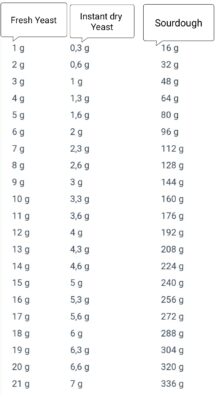Scoolinary › Forums › Ask a question › Creative Breads Using Sourdough – 100% sourdough instead of yeast?
Tagged: sourdough
-
Creative Breads Using Sourdough – 100% sourdough instead of yeast?
Escrito por Oxana Shmatova on noviembre 2, 2023 en 15:27Hello together, do you think it would be possible to exchange yeast in the recipes for sourdough? If yes -in what proportions? I would like to try those amazing recipes completely without yeast. Thanks!
Dani_Vila respondió hace 1 año, 5 meses 5 Miembros · 11 Respuestas -
11 Respuestas
-
Hi Oxana. Yes, it is possible, but as you can imagine, it is not always a straightforward conversion. The ratio to use is 100 grams of sourdough starter to replace 7 grams of yeast. However, you might have to try the same recipe a couple of times to determine the best fermentation time, since sourdough will take a lot longer than a commercial yeast dough. The addition of the starter will also have a slight impact on the hydration of the product, so you might want to adjust the amount of liquid. Good luck!
-
Thank you Mandie!
It was my worry – the volume of sourdough to reach similar effect of yeast – that would also effect the hydration level. But maybe I would try to combine first smaller portions of sourdough instead of yeast and longer fermentation time. It would be great if the author of the course would offer this “alternative” in his recipes 🙂
-
-
Level:
Scoolinary Team
Hi, @infolinuschka-de @infomamas-sonnenschein-de
I am sending you a table of equivalences so that you can replace the types of yeast with sourdough according to weight. We hope this information is helpful.
Greetings
-
Level:
Scoolinary Team
Hi, @infomamas-sonnenschein-de
I send you the link to a page where you can calculate the amount of sourdough by the amount of flour.
I think the page is in Spanish but you have the option to change the language. -
Level:
Scoolinary Team
I hope both Sussan´s and @mandie-lowe ´s responses have helped you.
Welcome to our Community and feel free to share pics of that wonderful bread (or any other dish you make). 😍 We absolutely love seeing your creative process. We enoy it so much we’ve created an award; the #ScoolistarStar. If your pic gets one, we’ll upload it on our Instagram stories and add it to our ‘Culinary Hall of Fame’.
🏆 You may also join our challenges: we launch one every two weeks, and you may win a Scoolinary apron.
Take care!
-
Is there any possible way to determine the percentages of lactic and acetic acids in a sourdough starter? And the percentage of humidity?
Thanks in advance!
Hay alguna manera de determinar el porcentaje de ácido láctico y acético en la masa madre? ¿Y la humedad?
Gracias de antemano!
-
Level:
Scoolinary Team
Welcome to our Community 👋
While we wait for @sussan_scoolinaryteam ‘ s help I want you to invite you tod feel free to share pics of your dishes. We absolutely love seeing your creative process. We enoy it so much we’ve created an award; the #ScoolistarStar. If your pic gets one, we’ll upload it on our Instagram stories and add it to our ‘Culinary Hall of Fame’.
You may also join our challenges: this week we launched our very first marathon and there’s a super cool prize to win. All the Mini Challenges are fixed on top of our Feed.
Take care!
instagram.com
Welcome back to Instagram. Sign in to check out what your friends, family & interests have been capturing & sharing around the world.
-
Level:
Scoolinary Team
For optimal sourdough flavor, the ratio of lactic acid to acetic acid should be between 3:1 and 4:1. If the ratio changes to contain more acetic acid, the flavor generally becomes too sour.
Weaker acids, such as lactic acid and acetic acid, do not dissociate completely, meaning that not all of the acid molecules present will release their hydrogen ion. As lactic acid is a stronger acid compared to acetic acid, more lactic acid will be dissociated and therefore contribute more to the pH value. Is it possible to find out the total amount of acids within the dough? To find out, it is first homogenized with water to obtain a suspension.
Then it is titrated to a pH value of 8.5 with a 0.1 molar sodium hydroxide solution and then a machine called “Automated Titrator” is used, this provides reliable results.
We hope this information is helpful.
Greetings.
-
-
Log in to reply.


